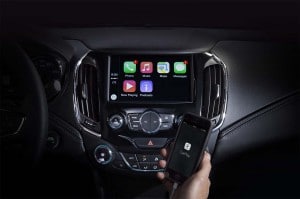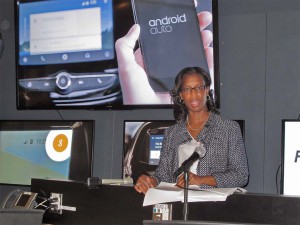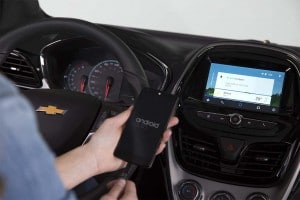
It’s becoming ever harder to walk – or drive — away from your smartphone. A day after Hyundai became the first automaker to formally confirm plans to add the new Android Auto system to its Sonata sedan, Chevrolet says it will go one better, rolling out both the Google-based system and Apple’s new CarPlay on 14 of its models next year.
Both technologies allow a motorist to go beyond basic pairing. It lets them actually operate a variety of different smartphone apps directly through the vehicle’s infotainment system, whether by using a touchscreen or voice commands. Chevy owners will be able to access 10 different audio services, for example, from Spotify to NPR to Major League Baseball – with more apps to follow, the maker hinted.

They’ll also be able to have text messages read out by artificial speech and dictate a reply. And whether using an Apple iOS or Google Android-based phone, motorists will be able to access the smartphone’s built-in navigation, potentially saving $1,000 or more on a factory-installed navi system.
“For most of us, smartphones are essential,” said General Motors CEO Mary Barra, during an appearance in Los Angeles. “Partnering with Apple and Google…is a great example of how Chevrolet continues to democratize technology that’s important to our customers.”
(Hyundai becomes first to announce production plans for Android Auto. Click Here for the story.)

Significantly, GM originally considered introducing the Android Auto and CarPlay systems on its flagship Cadillac brand but instead decided to go with the more mainstream Chevy.
That’s not entirely surprising. “It’s all about selling more cars,” Alicia Boler Davis, GM’s senior vice president overseeing its connected car operations, told TheDetroitBureau.com during a background briefing on Tuesday.
According to research by Strategy Analytics, there are 2.3 billion smartphones in use around the world. And a separate study by J.D. Power found that a growing number of buyers – especially among Gen-X and Millennials – are as influenced by a vehicle’s tech features as they are by conventional factors such as design, performance and even fuel economy.
(To see more about what kind of technology drivers want most in their cars, Click Here.)
Some observers may question the logic of adding even more smartphone features to a vehicle considering that distracted driving is blamed by federal regulators for about 11% of automotive accidents. GM officials contend that systems like CarPlay and Android Auto could actually improve safety by getting motorists to stop looking at their smartphone screens, using instead the text-to-voice feature.
Chevy’s version of the two systems also will access contact lists and calendar entries by voice command.
(Click Here for details about Apple’s CarPlay system.)

Chevy – and other automakers – have been working closely with both Apple and Google on the new systems. “You want the user experience to be familiar” to what a smartphone owner would experience normally, explained Saejin Park, GM’s Director of Innovation.
The race to build ever-smarter infotainment and telematics systems has been heating up in recent years, but CarPlay and Android Auto are among the latest twists. Apple officials say they know of at least 40 vehicle models that will soon feature their smartphone link.
Like Hyundai, some automakers plan to partner with one or the other of the two major providers. But some, like Chevy, have decided they need to have both Apple and Android capabilities to avoid alienating some potential buyers.
Chevrolet has also been making a major push into in-car connectivity with the addition of built-in 4G LTE WiFi. It will be available on virtually all of its 2016 models. That service adds a number of potential capabilities and GM’s OnStar telematics subsidiary will add a new remote diagnostics feature next year. Among other things, it will read onboard operating information and compare that to a broader user database to warn, for example, if a vehicle’s battery is getting ready to fail.
While there are fees for using OnStar and the 4G LTE service – provided in partnership with AT&T – Chevrolet does not plan to charge anything for the new Apple CarPlay and Android Auto features. But motorists will have to buy vehicles equipped with either a seven- or eight-inch touchscreen.
(Google reveals details about the Android Auto system. For more, Click Here.)








Really? Smartphones for dumb, dangerous inattentive drives is suppose to be a good thing? What happened to personal responsibility?
This is much better than people looking down and away from the road. It will be akin to changing the radio station or other similar tasks. These will have the keyboard disabled whilst the vehicle is in gear so users won’t be able to text, search, FB, etc whilst driving.